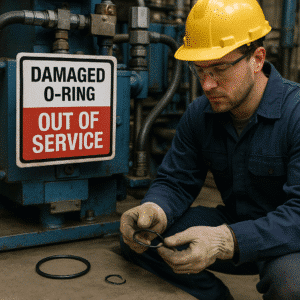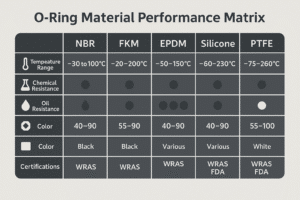When facing extreme heat or aggressive chemicals, many seals fail—unless you're using Viton O-rings.
Are your systems protected, or is downtime one step away?
Viton O-rings are premium FKM-based seals engineered to perform where others break down—whether in engines, chemical plants, or high-demand hydraulics. In this article, I’ll break down what makes them different, when to use them, and why many procurement teams are making the switch.
What Is a Viton O-Ring?
Viton O-rings are made from FKM (fluorocarbon rubber), known for exceptional resistance to heat (up to 250°C), fuel, and aggressive chemicals. These qualities make them ideal for:
- Automotive engines and fuel systems
- Bombas hidráulicas
- Aerospace and marine
- Chemical reactors and process systems
Compared to standard NBR seals, Viton offers superior lifespan, particularly in harsh environments.
Check out our complete product page for Viton FKM O-Rings.
What Is Another Name for Viton?
“Viton” is a registered brand name originally from DuPont, referring to their proprietary FKM material.
Many people use “Viton” and “FKM” interchangeably. However, not all FKM is Viton—non-branded versions may differ in purity and reliability. For critical applications, sourcing genuine Viton or verified high-grade FKM is crucial.
If you're comparing seal types, we’ve got a full guide to FKM seals that covers all variants and uses.
What Are the Advantages and Disadvantages of Viton?
Here’s a quick comparison of Viton vs NBR:
| Propiedad | Vitón (FKM) | Nitrilo (NBR) |
|---|---|---|
| Rango de temperatura | Up to 250°C | Hasta 120°C |
| Oil & Chemical Resistance | Excelente | Bien |
| Flexibility (Cold) | Moderate (-20°C limit) | Better at low temps |
| Costo | Más alto | Economical |
| Durabilidad | De larga duración | Shorter in harsh use |
Advantages of Viton:
- Withstands aggressive fuels and solvents
- Minimal swelling in oils
- Performs under thermal cycling and pressure
- Long lifespan even under harsh conditions
Disadvantages:
- More expensive than standard elastomers
- Reduced flexibility below -20°C
Still undecided? Check our detailed article on Viton vs. NBR O-rings.
Where Are Viton O-Rings Used in Industrial Applications?
Viton seals are ideal when failure is not an option.
Common uses:
- Automotive fuel systems
- Chemical reactors and mixers
- High-pressure hydraulics
- Oil & gas pipelines
- Aircraft engines
Not suitable for:
- Freezing temperatures below -20°C
- Low-cost, non-critical sealing tasks
- Water-only environments (use EPDM instead)
Many of our clients use Viton in some systems and NBR in others, depending on cost and performance needs. One Southeast Asian distributor relies on Viton for chemical reactors but switches to Juntas tóricas NBR for pumps and general maintenance.
If you manage multiple systems, our Guía del kit de juntas tóricas helps you stock the right materials.
Why Is Viton So Expensive?
The cost of Viton reflects:
- Higher-grade raw materials
- Complex compounding and curing process
- Better chemical and thermal stability
- Longer service life (less replacement frequency)
It's a value play—more upfront, but savings in labor, downtime, and production interruptions. Want to know what really causes seal failures? Read our complete prevention guide.
How We Helped a Chemical Plant Cut Downtime by 50%
We get it—switching seal materials can feel risky. So here’s what happened when one of our European clients made the leap.
How Did One German Client Use Viton to Solve Seal Failures?
One of our clients, a chemical plant in Munich, was experiencing unplanned shutdowns due to recurring seal failure in their high-temperature reaction tanks. They were using NBR O-rings, which degraded quickly due to solvent exposure and 180–200°C operating temperatures.
After testing, they decided to:
- Replace all NBR seals in critical reactors with Viton O-rings
- Implement FKM in both static and dynamic seals
- Utilice nuestro O-Ring Kits for system-wide maintenance
The result?
- Unplanned downtime dropped by 52% over 6 months
- Maintenance costs cut by 40%
- Production uptime improved by over 12%
- Procurement standardized Viton across all high-temp units
Today, they’ve made Viton their default for reactors and critical process lines.
Final Takeaway: Is Viton the Right Fit for You?
If your systems face high heat, aggressive media, or long service cycles, Viton could be your most reliable sealing partner. It’s not just about buying a better O-ring—it’s about preventing failure before it costs you thousands.
For engineers, buyers, and MRO managers, the key is balance: material cost vs. system integrity.
Let us help you make the right choice.
Choose Better Sealing—Avoid Emergency Downtime
We help global distributors, OEM engineers, and maintenance managers upgrade to the right seal—whether that’s Viton or not.
📧 Correo electrónico: [email protected]
📲 WhatsApp: +86 17622979498
Let’s find your leak-free solution.
Related Topics
O-Ring Seal Guide: Basics and Selection
Compare Viton vs. NBR for Harsh Conditions
Explore High-Temp Viton O-Ring Kits
See Our Full O-Ring Kit Collection
Seal Failure Prevention Guide


